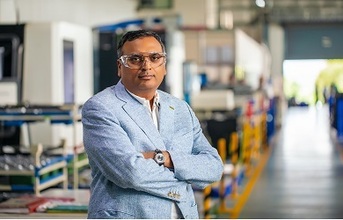
Taking a long-term view
How does Melligeri see the aerospace industry in India evolving at present? He explains that globally, the aerospace industry has a fairly well-defined structure - OEMs, tier 1 players for aerostructure manufacturing and for some system manufacturing, tier 2 suppliers for machined part manufacturing and sub assembly manufacturing, tier 3 players who are into treatments and tier 4 who are material suppliers. "Customers come to India primarily for detailed parts. India already had a huge amount of automotive machining excellence. So, it was incremental learning for India. Most of the OEMs, tier ones and tier twos chose to come to India to source the detailed parts."
Melligeri realised that there is no large detailed parts manufacturer in India. Most of the players were basically mom & pop shops with five, ten or fifteen machines. "That would never be enough for customers who came with big jobs. Aerospace customers were looking at partners who could absorb these big jobs. For this, we believed that we need scale. If a company is only doing business worth US$10 million, then it cannot absorb business worth US$ 20 million or US$30 million. You have to be a US$100 million company to be able to do that. And that's the aim that we set for ourselves. That's how we build our capacity. In fact, our capacity today is two times the sum of the country's overall capacity in terms of detailed parts manufacturing in aerospace. We continue to grow 40 percent to 50 percent year on year. Today, customers recognise that if they need detailed parts in India, they can come to Aequs. In fact, we are now also building the next tier suppliers for this industry in India," he explains.
What's needed!
What are Melligeri's expectations from the government when it comes to his industry? "Our biggest complaint to the government is the lack of access to the capital to grow. Aerospace manufacturing industry needs a lot of capital. I also feel that the expectations of the banks with regards to the collaterals are unreasonable. In competitive geographies, it is far easily available. If the government wants to make this a focused and export industry, then they need to step up and do something about that. Otherwise, if the government can launch a civil aviation program with a long-term horizon, then it can help the industry. Can we make a difference in the next two years to three years? Absolutely not! Can we make a difference in the next five years to ten years? Absolutely not! Can we make a difference in the next thirty-three years? Absolutely yes. If governments can take such a long-term view, then it will be good. But I think it is difficult for them to do something like this," he shares.
Towards globalisation
For the first several years, Melligeri and his team just focused on the ability to deliver from Aequs. "In the last three years, we have started looking outside India. We did some acquisitions abroad to enhance our capabilities and started getting clients to transfer some work in India through those acquisitions." That is something which continues to happen. "We have defined the core areas - aero systems and aero structures - in which we will continue to work. Today, many times we are bidding for the customers where the 20 percent work is done close to the customers and the 80 percent work is done in India. The idea is to bring better economics to them and also risk mitigation. That's the ecosystem that we are talking about globally. But we have seen that customers are more and more inclined to come to India because of the integrated ability that we have built around this place. That way it is easier for them," he says.
(Continued on the next page)


























